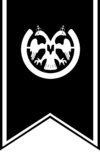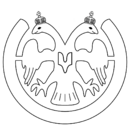Ragucin Empire: Difference between revisions
Jump to navigation
Jump to search
No edit summary |
No edit summary |
||
| (2 intermediate revisions by the same user not shown) | |||
| Line 1: | Line 1: | ||
{{WIP}} | {{WIP}} | ||
{{Infobox former country | {{Infobox former country | ||
|native_name = <small>''Ragacīnas Kieneste''<br>''Ragacino Imperija''<br>'' | |native_name = <small>''Ragacīnas Kieneste''<br>''Ragacino Imperija''<br>''Raguskariika''<br>''Raguschinenreich''</small> | ||
|conventional_long_name = Ragucin Empire | |conventional_long_name = Ragucin Empire | ||
|common_name = Ragucinia or Ragucins | |common_name = Ragucinia or the Ragucins | ||
|era = Middle Ages | |era = Middle Ages | ||
|government_type = {{wp|Feudalism|Feudal}} {{wp| | |government_type = {{wp|Feudalism|Feudal}} {{wp|absolutism|absolute}} {{wp|monarchy}} | ||
|year_start = 1297 | |year_start = 1297 | ||
|year_end = 1404 | |year_end = 1404 | ||
| Line 40: | Line 40: | ||
}} | }} | ||
The '''Ragucin Empire''' or '''Ragucin Kingdom''' was an expansive state that dominated most of [[Erdara]] from the rise of [[Dilisme]] and the sack of Kuldiga in 1297 to the death of [[Ivars II]] in 1404. The Ragucin Empire's conquests, especially those under King Dilisme, would influence Erdaran, and more broadly [[Gaia|Iraian]], army tactics for years to come, utilising larger cavalry-to-infantry ratios and more agile cavalry as opposed to heavy cavalry with large amounts of armour. | The '''Ragucin Empire''' ({{wp|Latvian language|Hytek}}: ''Ragacīnas Kieneste'', {{wp|Lithuanian language|Juznik}}: ''Ragacino Imperija'', {{wp|Northern Sami language|Almic}}: ''Raguskariika'', {{wp|German language|Hesurian}}: ''Raguschinenreich'') or '''Ragucin Kingdom''' was an expansive state that dominated most of [[Erdara]] from the rise of [[Dilisme]] and the sack of Kuldiga in 1297 to the death of [[Ivars II]] in 1404. The Ragucin Empire's conquests, especially those under King Dilisme, would influence Erdaran, and more broadly [[Gaia|Iraian]], {{wp|military tactics|army tactics}} for years to come, utilising larger {{wp|cavalry}}-to-{{wp|infantry}} ratios and more agile cavalry as opposed to heavy cavalry with large amounts of {{wp|armour}}. | ||
[[Category:Hytekia]] | [[Category:Hytekia]] | ||
Latest revision as of 17:48, 2 April 2020
This article is incomplete because it is pending further input from participants, or it is a work-in-progress by one author. Please comment on this article's talk page to share your input, comments and questions. Note: To contribute to this article, you may need to seek help from the author(s) of this page. |
Ragucin Empire Ragacīnas Kieneste Ragacino Imperija Raguskariika Raguschinenreich | |
|---|---|
| 1297–1404 | |
| The Ragucin Empire in green with subjects in light green at its height in 1378 The Ragucin Empire in green with subjects in light green at its height in 1378 | |
| Capital | Kuldiga (1297-1299) Krasno (1299-1404) |
| Common languages | Hytek Juznik Almic Hesurian |
| Religion | Cathartic Ditanery |
| Government | Feudal absolute monarchy |
| King | |
• 1297-1323 | Dilisme (first) |
• 1391-1404 | Ivars II (last) |
| Historical era | Middle Ages |
| 15 May 1297 | |
• Death of Ivars II | 5 June 1404 |
The Ragucin Empire (Hytek: Ragacīnas Kieneste, Juznik: Ragacino Imperija, Almic: Raguskariika, Hesurian: Raguschinenreich) or Ragucin Kingdom was an expansive state that dominated most of Erdara from the rise of Dilisme and the sack of Kuldiga in 1297 to the death of Ivars II in 1404. The Ragucin Empire's conquests, especially those under King Dilisme, would influence Erdaran, and more broadly Iraian, army tactics for years to come, utilising larger cavalry-to-infantry ratios and more agile cavalry as opposed to heavy cavalry with large amounts of armour.

